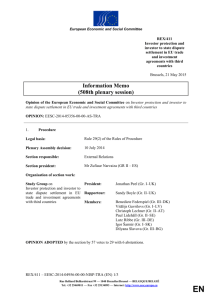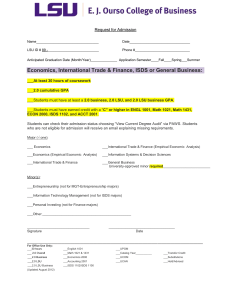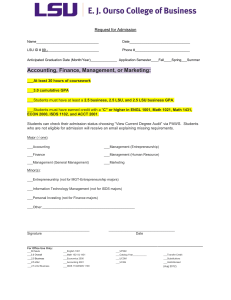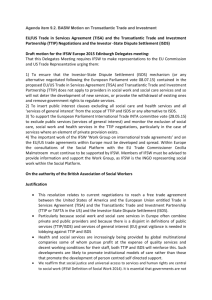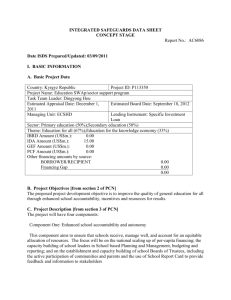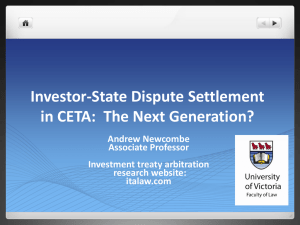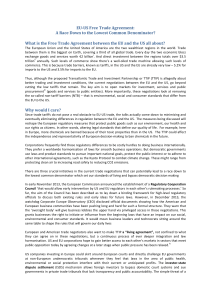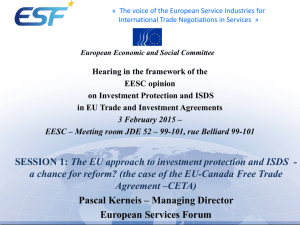Investor protection and investor to state dispute settlement in EU
advertisement
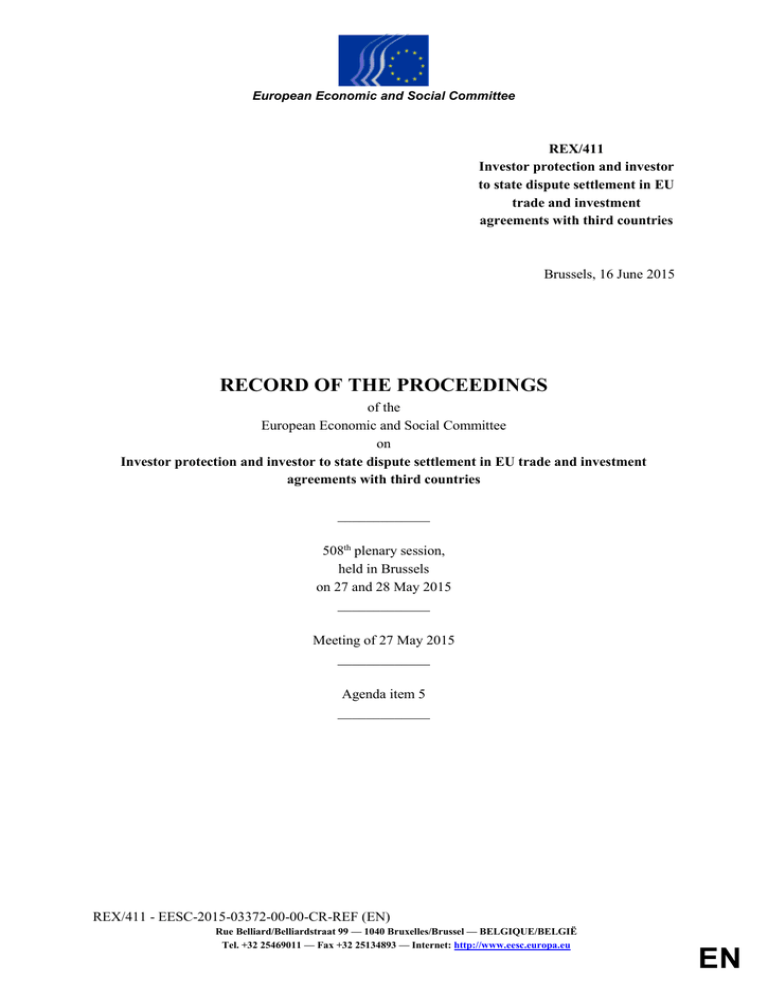
European Economic and Social Committee REX/411 Investor protection and investor to state dispute settlement in EU trade and investment agreements with third countries Brussels, 16 June 2015 RECORD OF THE PROCEEDINGS of the European Economic and Social Committee on Investor protection and investor to state dispute settlement in EU trade and investment agreements with third countries _____________ 508th plenary session, held in Brussels on 27 and 28 May 2015 _____________ Meeting of 27 May 2015 _____________ Agenda item 5 _____________ REX/411 - EESC-2015-03372-00-00-CR-REF (EN) Rue Belliard/Belliardstraat 99 — 1040 Bruxelles/Brussel — BELGIQUE/BELGIË Tel. +32 25469011 — Fax +32 25134893 — Internet: http://www.eesc.europa.eu EN -1- The President moved that the Committee turn to agenda item 5 - adoption of an own-initiative opinion on the Investor protection and investor to state dispute settlement in EU trade and investment agreements with third countries. The preliminary work had been carried out by the Section for External Relations (president: Mr Zufiaur). The rapporteur was Mr Boyle. The section had adopted its opinion on 28 April 2015 by 57 votes to 29 with 6 abstentions. 10 amendments were tabled. During the Plenary session, the rapporteur, Mr Boyle, presented the Section Opinion. He underlined that the Committee has supported the general opinion on the TTIP and has given support to the TTIP negotiations. He regretted however that on Investor to State Dispute settlement (ISDS), it was not possible to find a compromise between the three EESC groups and that a counter-opinion was tabled by the Employers group. He indicated that the opinion underlines the need for investment protection and even includes a chapter with the arguments in favour of the ISDS. Nevertheless, the opinion concludes that the ISDS system can derail the Transatlantic Trade and Investment Partnership (TTIP) negotiations and the ratification of the Comprehensive Trade and Economic Agreement (CETA) between the EU and Canada and that ISDS mechanism is not needed in these agreements. The opinion concludes in favour of the creation of an International investment court as immediate priority. During the general debate Ms Butaud-Stubbs stated that ISDS is a complex subject that divides civil society. She indicated that there is the need for a new model that may offer alternatives for companies. Ms Federspiel stated that the opposition to the ISDS does not imply an opposition to trade and that even the European Commission has indicated the need for a new system to be created. Mr Adamczyk and Mr Lechner indicated that the ISDS system brings up some problems regarding the relationship between ISDS and the domestic legal systems. Ms Studničná indicated that some of the new EU members from Central and Eastern Europe have bilateral investment treaties with the US that include ISDS, which presents a risk to the state's right to regulate. Mr Biermann, Mrs McKnight, Mr Longo and Mr Greif expressed their support to the conclusions of the opinion. Mr Guerini indicated that the concentration of capital has increased in recent years and that some multinationals are very powerful. Mrs Kekeleki indicated that ISDS brings up democratic problems. REX/411 - EESC-2015-03372-00-00-CR-REF -2Ms Bischoff underlined the importance of the debate on ISDS and the need to send a clear message to the European Parliament. Mr Dassis showed his disappointment concerning the counter-opinion presented by the Employers Group. Mr Nurm insisted on the transparency of the negotiations. Mr Almeida Freire indicated that it was not possible to find consensus between the groups and he stressed the need to contribute positively to the efforts of the European Commission to elaborate a new system for investment protection. The Plenary considered afterwards the counter-opinion, tabled by Group I as follows: Delete the whole text of REX/411 and replace as follows: 1 2 1. Conclusions and Recommendations 1.1 Foreign Direct Investment (FDI) is an important contributor to economic growth and jobs. Companies that invest in another country are ipso facto taking a specific risk, but foreign contractors need to be protected against disproportionate and abusive treatment by the host State where they have invested, such as through direct expropriation, discrimination on grounds of nationality and unfair and unequal treatment when compared with domestic investors. A neutral dispute mechanism is important. Investments are often very long term and political circumstances in host States can change. 1.1.1 An International Investment Agreement (IIA) between two States (or regions) involves international law. To be effective that needs an effective, balancing, international dispute settlement mechanism. 1.1.2 In most IIAs however the dispute settlement mechanism puts together individual companies and the host State through the Investor to State Dispute Settlement (ISDS) Procedure1. ISDS is retrospective in character. Unlike the WTO Dispute Settlement Procedure, if a State loses a case only payment of compensation is involved. It does not need to repeal the relevant legislation. Investment is not a WTO competency, being dropped from the Doha Round Agenda in 2003. 1.2 The EU is both the largest provider and recipient of international investment. Investment is a core interest for EU business, including SMEs. The Committee therefore welcomes the Commission position2 that ISDS is: Provision for ISDS is found in some 93% of the more than 3,250 IIAs signed to date, although the procedure has only been used in under 100, less than 3%. EC – Factsheet on ISDS – Paragraph 2, 3/10/2013. REX/411 - EESC-2015-03372-00-00-CR-REF -3 1.2.1 A Business Round Table organised by the EESC Employers' Group on the Transatlantic Trade and Investment Partnership (TTIP), concluded3 that: "An international agreement such as TTIP should create the right conditions to attract a high level of future investment in the transatlantic market. This includes granting ample access and non-discriminatory treatment for investors on both sides and improving the current framework for IP, including ISDS by making it more accessible to SMEs and striking a proper balance between investor rights, the right of States and local authorities to regulate in the public interest". 1.3 The EU-Canada trade agreement (CETA), yet to be ratified, includes an extensive investment protection chapter including provision for ISDS. This, together with the investment chapter in the EU-Singapore Free Trade Agreement4, is the first ever investment agreement negotiated by the EU since it gained competency for investment under the Lisbon Treaty in 2009. This has gone a long way to address outstanding concerns, but ISDS needs to evolve further. 1.4 Apart from the principle of "Most Favoured Nation" (MFN), and the cover normally included by the Commission to deal with compensation in cases of war, revolution and so on, the Committee urges that investor protection under an IIA and therefore open to the use of ISDS, must be restricted to cover the four substantive protections, namely 1.5 3 4 an important tool for protecting investments and therefore for promoting and securing economic growth in the EU; an effective way of enforcing the obligations our trading partners agree on with our investors when they sign investment treaties. not to discriminate on grounds of the nationality of an investor; a minimum standard of treatment, usually described as "fair and equitable"; prompt, adequate and effective compensation when expropriation occurs (not discriminatory and with due process); Allowing transfer of funds related to the investment. Over time a number of real and perceived abuses have arisen through the use of ISDS and these need to be addressed. ISDS needs to be updated. The Committee welcomes the four areas for further study on investment protection and ISDS identified by the Commission in January 2015 as a result of its public consultation on investment protection and ISDS in TTIP, following its inclusion in the mandate for the negotiations given unanimously by the Member States. EESC Business Round Table – Common Declaration on TTIP, 16/12/2014. Also still to be ratified, and subject to legal challenge in the ECJ as to whether it is a "mixed" agreement and therefore needing approval by all MS Parliaments. REX/411 - EESC-2015-03372-00-00-CR-REF -4- 1.5.1 These covered: 5 the protection of the State's right to regulate; the establishment and functioning of arbitral tribunals; the review of ISDS decisions through an appellate mechanism; the relationship between ISDS and domestic judicial systems. 1.5.2 The Committee considers due protection of the State's right to regulate to be essential, and any remaining ambiguities removed. As stated in the Committee's opinion on TTIP5, it is "essential that any ISDS provision proposed in the TTIP does not hinder the ability of the EU Member States to regulate in the public interest". Previous IIAs have been primarily drafted with the need to protect investments. Both CETA and the Singapore Agreement have tightened key definitions to avoid unwarranted interpretations and specifically refer to the right to regulate in the preamble to each agreement. The EESC considers that this should now be included in the body of the relevant text, as a specific Article of any such agreement. 1.5.3 It is essential that arbitrators on ISDS tribunals must be fully impartial and not open to conflicts of interest. The Committee urges that all arbitrators must be chosen from a roster pre-established by the Parties to the relevant agreement, and that clear qualifications are established for such arbitrators, notably that they are qualified to hold judicial office and have proven expert knowledge in the relevant fields of international law. 1.5.4 An appellate mechanism is also essential – a legal process without a right of appeal is rightly very rare, although this exists in current IIAs. The EESC notes reference was made to an appellate mechanism in the original TTIP negotiating directives. Design of such a mechanism will be critically important, including the methods how members are designated, their qualifications and remuneration, together with any time limits to be applied. It should cover errors of law and errors of fact. Early consideration should be given as to whether a bilateral mechanism could be made multilateral, perhaps modelled on the WTO Appellate Body. Any such mechanism will involve extra costs, but that should be taken into account. 1.5.5 The relationship between ISDS and domestic judicial systems will be harder to resolve. IIAs are international agreements and domestic courts do not necessarily have the competence to interpret matters of international law. Even the best system can falter, but double claims should be prohibited. Either potential litigants should Opinion REX/390 - Transatlantic trade relations and the EESC's views on an enhanced cooperation and eventual EU-US FTA 4 June 2014. Rapporteur: Jacek Krawczyk, Co-rapporteur: Sandy Boyle. (http://www.eesc.europa.eu/?i=portal.en.rexopinions.32281). REX/411 - EESC-2015-03372-00-00-CR-REF -5make a final choice at the start of proceedings, or lose the right to go to domestic courts as soon as they turn to ISDS. 1.6 A multilateral, international court is the longer term answer. This needs to be developed in parallel with the development of ISDS in TTIP and elsewhere. It is imperative that some form of international investor protection remains whilst such an international body is negotiated and established. 1.6.1 It is important to ensure critical mass for the establishment of an international court as the longer term objective for investment dispute settlement. The widespread acceptability of such an international appellate mechanism is likely to stem from it being set up through consensus, which should deal with potential related problems that all new international institutions, including the International Criminal Court, face. 1.6.2 The EESC cautions against the suggestion that, as all "G7" members are currently involved in IIA negotiations, these ones start to develop an international court separately by themselves. Critical mass can only be achieved if a much wider spread of countries involved from the onset, and the door is left open for others to join as and when they are interested. 1.6.3 In the meantime, the EESC recommends the EU and the US to engage on a bilateral investment dispute settlement mechanism in the TTIP. 2. Background 2.1 The Committee notes that if two countries desire to promote economic relations with each other through an International Investment Agreement, each will promise the other that they will guarantee certain levels of treatment to investors and investments from the other country. These promises, willingly entered into, then need to complete full domestic ratification processes. They do not in any way prioritise corporate interest over the right of governments to so regulate. In the interests of the rule of law governments do however need to be held to the guarantees they give. 2.2 The Committee recognises that, although negotiating States look to include provisions to protect their own companies against discriminatory actions of trade partners, it is unrealistic for an aggrieved company to expect that any dispute should automatically be taken up at State-to-State level, thus raising the issue to a political or diplomatic level. 2.2.1 If companies were to rely on the EU to take disputes up on a State to State basis, only a very few could be so pursued, and smaller companies would be less likely to have their voices heard. It is unlikely that there would be many cases between two mature REX/411 - EESC-2015-03372-00-00-CR-REF -6democratic legal systems, but if State-to-State Dispute Settlement Procedure were to become the norm, the number of potential cases would be bound to rise, with major resource implications for States. 6 7 8 9 2.2.2 As Commissioner Malmström herself has pointed out6 in connection with the TTIP negotiations, international law cannot be invoked in US courts, and no US law prohibits discrimination against foreign investors. In other countries, domestic courts may be less trustworthy. 2.2.3 Investment is not identical to trade. In a trade dispute the onus is clearly on a State to take the lead. Such disputes are likely to involve a class of production, such as bananas, solar panels or textiles: dumping is a key WTO DSP issue. 3. The evolution of ISDS 3.1 Although the overall number of ISDS cases7 remains small, its use has grown substantially since 2002. This is proportionate to the increase in overall FDI, which globally by 2013 had exceeded US$25tr. European investors have launched some 50% of all claims since 2002. A sizeable number of these have been launched by smaller or specialist companies8. It is important that any reformed ISDS procedure must be made more accessible to SMEs. 3.1.1 Of the 356 known cases that have been concluded, 25% were resolved in favour of the investor, and 37% in favour of the State. The rest were settled9. 3.2 Due to issues - both perceived and in reality - arising from the outcome of a number of ISDS cases worldwide, including a number that are still on-going, an increasingly notable part of public opinion in the EU, led by unions, NGOs and other organisations, has become concerned about its use, with opposition growing to an investment chapter and ISDS in TTIP. 3.3 Without reform of ISDS, and the inclusion of an Investment Chapter in TTIP, the Committee notes that previous arrangements as found in the 1,400 Bilateral Investment Treaties (BITs) negotiated by individual Member States (with the exception of Ireland), and those in particular previously reached by nine Member States with the US, would of course still stand and remain valid. EP, 18 March. 610 cases by the end of 2014. The Stockholm Chamber of Commerce reports that out of some 100 cases completed between 2006 and 2011, some 22% were undertaken by SMEs; the BDI also report that some 30% cases undertaken by German companies were from SMEs. EC Factsheet on ISDS, 3 October 2013. REX/411 - EESC-2015-03372-00-00-CR-REF -7Mr Peel presented the counter-opinion by saying that the business community cannot agree with the options presented in the opinion and it presents a different approach. This approach is based on the fact that international natural dispute settlement is essential because international law cannot be invoked in the US court and State to State dispute settlement is not a workable solution. He indicated that ISDS reform in CETA is already a major step forward, but the Commission identifies a possibility for improvements and the EESC needs to take the debate forward and to support the European Commission. He also insisted that an International Court cannot be set up immediately and investment dispute settlement is needed in the meantime. The counter-opinion was rejected by 94 to 191 with 25 abstentions. The Plenary considered afterwards the amendments as tabled. Mr Boyle tabled an amendment as follows. Point 3.4.2 Amend as follows: High costs have led to the growth of third party funding of claims whereby banks, hedge funds and insurance companies invest in a case in exchange for a share of the compensation awarded. By reducing the financial risk for companies this contributes to an increase in frivolous cases for which States still bear full legal costs. The EESC is strongly opposed to the reported speculative investment by hedge funds in specific ISDS cases for a share in any compensation awarded.8 The amendment was accepted by the Plenary. Mr Somville tabled the following amendment: Point 4.4 Amend as follows: A Business Round Table organised by the EESC Employers' Group on TTIP concluded in a common declaration10 that: "An international agreement such as TTIP should create the right conditions to attract a high level of future investment in the transatlantic market. This includes granting ample access and non-discriminatory treatment for investors on both sides and improving the current framework for IP, including ISDS by making it more accessible to SMEs and striking a proper balance between investor rights, the right of states and local authorities to regulate in the public interest". The need to ensure that the ISDS provisions REX/411 - EESC-2015-03372-00-00-CR-REF -8proposed in TTIP in no way hinder the ability of the EU Member States to regulate in the public interest was also pointed out in the conclusions to a joint meeting on the transatlantic negotiations held by the Farmers and Consumers and Environment categories in June 2014. The amendment was accepted by the rapporteur and by the Plenary. Mr Boyle tabled the following amendments: Point 6.6 Amend as follows: Four areas have been identified by the EC where further improvements should be explored: protection of the right to regulate establishment and functioning of arbitral tribunals relationship between domestic judicial systems and ISDS review of ISDS decisions through an appellate mechanism. They are amplified upon in the concept paper "Investment in TTIP and beyond- the path for reform", presented by Commissioner Malmström to the European Parliament and to the Council in May 2015. Point 6.7 (new) Add a new point 6.7 after point 6.6 as follows: 6.7 The EESC is surprised to learn that, at the at the Civil Society Dialogue meeting on 18th May, it was confirmed that the IP model currently being used in the FTA negotiations with Japan is the one agreed in CETA. Given that the Commissioner, in her concept paper "Investment in TTIP and beyond - the Path for Reform" presented to the EP on 6th May, has identified numerous areas for further improvement in the CETA text, the Committee is concerned that this continues to form the basis for negotiation with such an important global partner as Japan. The amendments were accepted by the Plenary. REX/411 - EESC-2015-03372-00-00-CR-REF -9- Mr Boyle presented the following amendment. Point 1.3 Amend as follows: ISDS must not elevates trans-national capital to that of a sovereign state or and enables foreign investors to challenge the right of governments to regulate and determine their own affairs. Mr Boyle explained that "trans-national" should be kept in this amendment. The amendment with this minor adjustment was accepted by the Plenary. Mr Boyle tabled the amendment as follows. Point 1.9 Amend as follows: The EU Agreement with Canada (CETA), signed in late 2014, together with the separate investment chapter added to the EU-Singapore FTA, contain the first ever investment chapters negotiated by the EU in any agreement since the EU gained competence for investment under the Lisbon Treaty in 2009. Although these chapters look to provide improvements to the current ISDS system, as well as setting out what has claimed by the EC to be, a new "state of the art" EU ISDS model, they fall well short of what is required to assuage public fears. The models in Singapore and CETA are not identical and, in the opinion of many, ISDS remains an imbalanced, highly expensive process which reins in democracy, has no right of appeal and puts at risk a government's right to regulate by providing foreign investors with rights beyond those enshrined in national constitutions and above those enjoyed by domestic investors. The EESC is concerned to note that the CETA text on ISDS is currently the basis for negotiation in the EU Japan FTA. The amendment was accepted by the Plenary. REX/411 - EESC-2015-03372-00-00-CR-REF - 10 - The following amendments were originally tabled by Mr Boyle, but during the debate he decided to withdraw them and to not submit them to the vote of the Plenary. Point 1.4 Amend as follows: 1.4 Over time a number of abuses have arisen through the use of ISDS and these now need to be addressed. The systematic shortcomings arising from the working of ISDS include opacity, lack of clear rules of arbitration, the lack of right of appeal, discrimination against domestic investors who cannot use the system, the fear that purely speculative investments are protected, which, inter alia, do not have the effect of creating jobs, and the fear of exploitation by specialist legal firms. The objective now is to propose an alternative dispute settlement procedure in the interest of reconciling the legitimate demands of investors with the concerns of other civil society resulting from such negative perceptions with ISDS. 1.5 The EC consultation on ISDS in TTIP highlighted a marked division between the views of the broad business community and those in the vast majority of responses from the rest of CS. This position is replicated within the EESC. Point 1.5 Amend as follows: Concerns exist over the powers invested in a panel of three private lawyers, to adjudicate and make binding decisions on areas of fundamental public interest. Despite the fact that UNCITRAL has recently adopted new rules on transparency concerns still exist that much of the current system lacks transparency and has no right of appeal. Point 1.14 Amend as follows: The need for FDI protection varies from country to country. In countries with a democratically functioning mature legal system free from corruption, investment disputes should be dealt with by mediation, domestic courts and State to state resolution. These components are present in EU, US and Canada and the current high levels of transatlantic investment flows show conclusively that the lack of ISDS provision does not impede investment. The EESC therefore concludes that an ISDS provision is not necessary in TTIP or REX/411 - EESC-2015-03372-00-00-CR-REF - 11 CETA and is opposed to its inclusion. The Employers' Group of the EESC dissent from this view for the reasons explained in Chapter 4. The opinion was adopted by 199 votes to 55 with 30 abstentions. _____________ REX/411 - EESC-2015-03372-00-00-CR-REF

